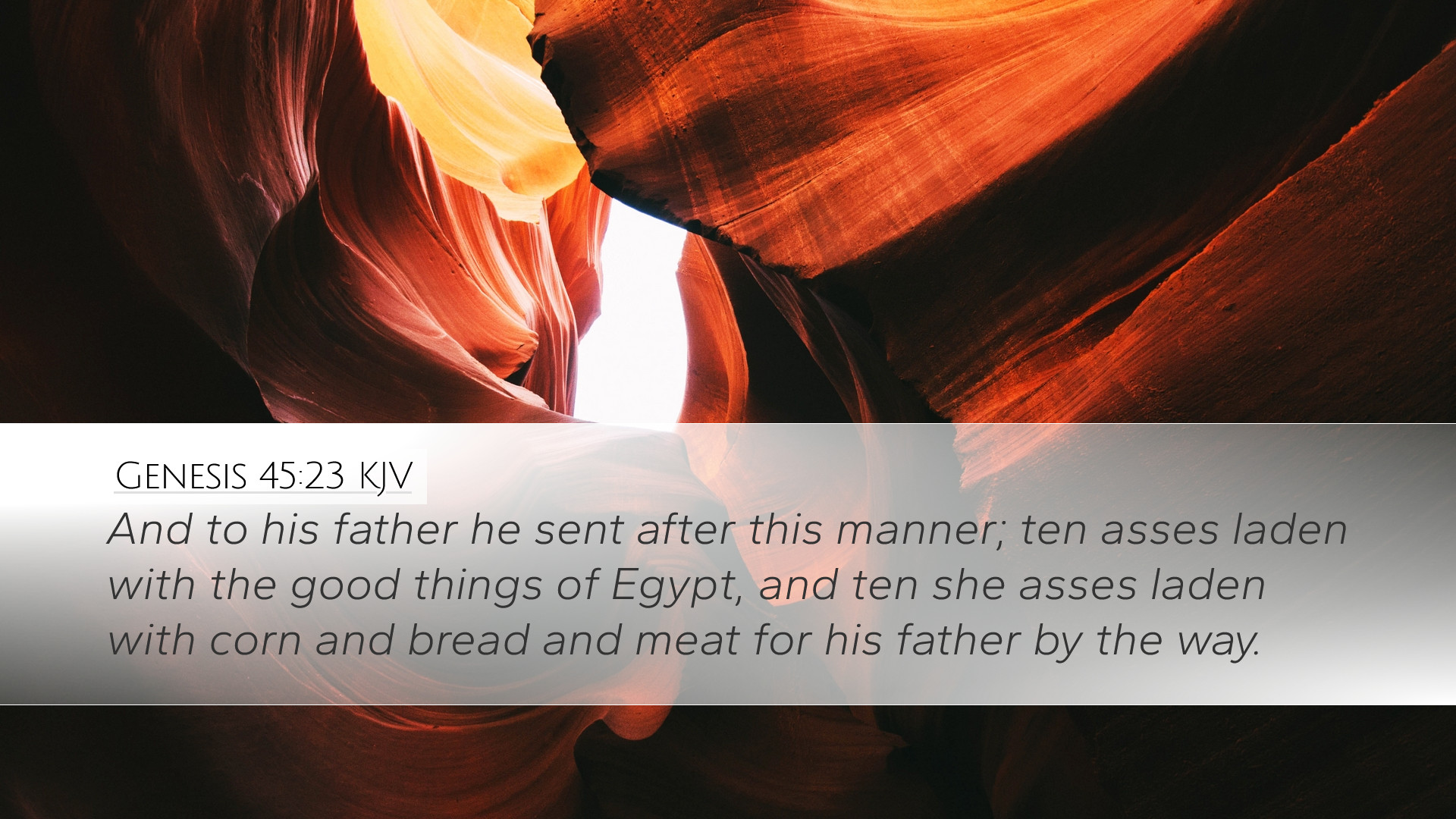Commentary on Genesis 45:23
Genesis 45:23 states, "And he sent to his father these things: ten donkeys loaded with the good things of Egypt, and ten female donkeys loaded with grain, bread, and food for his father for the journey." This verse captures a poignant moment in Joseph's life as he reconciles with his brothers and prepares to bring his family to Egypt during the famine.
Contextual Overview
The broader narrative of Joseph in Genesis is rich with themes of betrayal, forgiveness, and divine providence. Joseph, sold into slavery by his brothers, rises to power in Egypt and ultimately saves his family from famine. In this climactic moment of reconciliation, Joseph emphasizes not just familial ties but also generosity and provision.
Insight from Matthew Henry
Matthew Henry emphasizes the significance of Joseph's actions, noting that they are a demonstration of his compassion and the depth of his reconciliation with his brothers. Henry points out that the gifts sent to his father symbolize the abundance of God's blessings amidst trials:
- The Gifts: The ten donkeys laden with the good things of Egypt represent abundance, a stark contrast to the lack that his family had been experiencing.
- Symbolism of the Donkeys: Donkeys, in the biblical context, often signify humility but also service and labor. Their use in carrying these provisions may suggest the importance of shared burdens and responsibilities.
- Generosity: Henry notes that Joseph's gifts were meant to reassure his father, Jacob, and to exhibit the fruitful outcome of his trials in Egypt. The act is a testament to Joseph’s forgiveness despite their earlier treachery.
Insights from Albert Barnes
Albert Barnes provides a deeper look into the implications of the provisions Joseph sends. He highlights the practical aspects of the gifts and their deeper meaning:
- Practical Assistance: Barnes notes that the provision of grain and food was crucial for the survival of Jacob's family during a dire time of famine.
- Spiritual Significance: Beyond material sustenance, this provision can be interpreted as a spiritual act. It signifies Joseph’s desire for his family's restoration and reflects God's grace during times of need.
- Reconciliation: This act of sending gifts indicates a true reconciliation. Joseph's brothers had come empty-handed, but he ensures that they return loaded with blessings, suggesting that God’s forgiveness leads us to bless others abundantly.
Reflections from Adam Clarke
Adam Clarke provides an extensive theological reflection on this passage, interpreting the actions of Joseph not only in the context of family dynamics but also within the framework of divine providence:
- Divine Providence: Clarke emphasizes how Joseph’s rise to power was orchestrated by God, which speaks volumes about God’s sovereignty in human affairs. His capacity to provide for his family came from many hardships he endured.
- Faith in Action: Clarke asserts that Joseph’s sending of these provisions underscores his faith in God's plan. Despite the past wrongs, Joseph embraces his divine purpose and actively supports his family.
- Symbol of Christ: Clarke draws parallels between Joseph and Christ, suggesting that just as Joseph provided for his family, Christ offers salvation and sustenance to those who come to Him.
Theological Implications
This verse in its broader theological context provides meaningful insights for pastors and scholars:
- The Nature of Forgiveness: The reconciliation between Joseph and his brothers highlights key themes of forgiveness, emphasizing the necessity of grace in restoring relationships.
- The Role of Provision: The material provisions sent by Joseph serve as a reminder that God often meets our physical needs as He works through our lives and circumstances.
- Hope in Despair: Jacob and his family were at a point of desperation; the gifts symbolized hope and restoration, a reminder for believers of the hope found in God's faithful provision.
Conclusion
Genesis 45:23 and the commentaries by Henry, Barnes, and Clarke collectively deepen our understanding of this passage. The gifts from Joseph not only speak of reconciliation but also serve as a poignant reminder of God's provision, grace, and the importance of familial relationships. As pastors, students, theologians, and scholars reflect on this remarkably rich narrative, they are encouraged to consider the multifaceted nature of forgiveness and provision embodied in Joseph's actions.


